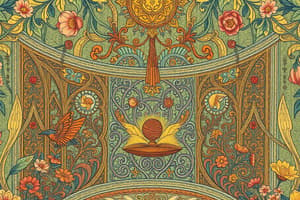Podcast
Questions and Answers
What is poetry primarily used to express?
What is poetry primarily used to express?
- Historical events and facts
- Rules and structures
- Scientific theories and formulas
- Thoughts and feelings (correct)
Which poetic device involves the repetition of initial consonant sounds in words that are close together?
Which poetic device involves the repetition of initial consonant sounds in words that are close together?
- Imagery
- Alliteration (correct)
- Metaphor
- Onomatopoeia
What is the name of the poetic movement that emphasizes emotion, imagination, and individualism?
What is the name of the poetic movement that emphasizes emotion, imagination, and individualism?
- Romanticism (correct)
- Realism
- Surrealism
- Modernism
What is the name of the short, three-line poem originating from Japan?
What is the name of the short, three-line poem originating from Japan?
What is the name of the poetic device that involves a comparison between two unlike things without 'like' or 'as'?
What is the name of the poetic device that involves a comparison between two unlike things without 'like' or 'as'?
What is the name of the poetic form that doesn't follow a specific rhyme or meter?
What is the name of the poetic form that doesn't follow a specific rhyme or meter?
Flashcards are hidden until you start studying
Study Notes
Definition and Characteristics
- Poetry is a form of literature that uses language in a creative and imaginative way to express thoughts, feelings, and ideas.
- It often employs a distinctive style and rhythm, and may use figurative language, such as metaphor, simile, and imagery.
Forms of Poetry
- Free Verse: A flexible and expressive form that doesn't follow a specific rhyme or meter.
- Sonnet: A 14-line poem, usually written in iambic pentameter, with a specific rhyme scheme.
- Haiku: A short, three-line poem originating from Japan, traditionally capturing a moment in time or nature.
- Ode: A formal, expressive poem that praises a person, place, or thing.
- Ballad: A narrative poem that tells a story, often with a folkloric or legendary theme.
Poetic Devices
- Imagery: Language that appeals to the senses, creating vivid mental images.
- Metaphor: A comparison between two unlike things without "like" or "as."
- Simile: A comparison between two unlike things using "like" or "as."
- Alliteration: The repetition of initial consonant sounds in words that are close together.
- Onomatopoeia: Words that imitate the sounds they describe.
Poetic Movements and Styles
- Romanticism: Emphasizing emotion, imagination, and individualism.
- Modernism: Experimenting with form, language, and structure.
- Surrealism: Exploring the subconscious and the irrational.
- Confessional Poetry: Focusing on personal, intimate, and often autobiographical themes.
Famous Poets and Works
- Homer: Ancient Greek poet, author of the epics "The Iliad" and "The Odyssey."
- William Shakespeare: English playwright and poet, known for his sonnets and plays.
- John Keats: English Romantic poet, famous for odes such as "Ode to a Nightingale."
- Emily Dickinson: American poet, known for her unique style and introspective themes.
- T.S. Eliot: Modernist poet, playwright, and critic, famous for "The Waste Land."
Definition and Characteristics
- Poetry is a form of literature that uses language in a creative and imaginative way to express thoughts, feelings, and ideas.
- Poetry often employs a distinctive style and rhythm, and may use figurative language.
Forms of Poetry
- Free Verse: a flexible and expressive form that doesn't follow a specific rhyme or meter.
- Sonnet: a 14-line poem, usually written in iambic pentameter, with a specific rhyme scheme.
- Haiku: a short, three-line poem originating from Japan, traditionally capturing a moment in time or nature.
- Ode: a formal, expressive poem that praises a person, place, or thing.
- Ballad: a narrative poem that tells a story, often with a folkloric or legendary theme.
Poetic Devices
- Imagery: language that appeals to the senses, creating vivid mental images.
- Metaphor: a comparison between two unlike things without "like" or "as."
- Simile: a comparison between two unlike things using "like" or "as."
- Alliteration: the repetition of initial consonant sounds in words that are close together.
- Onomatopoeia: words that imitate the sounds they describe.
Poetic Movements and Styles
- Romanticism: emphasizes emotion, imagination, and individualism.
- Modernism: experiments with form, language, and structure.
- Surrealism: explores the subconscious and the irrational.
- Confessional Poetry: focuses on personal, intimate, and often autobiographical themes.
Famous Poets and Works
- Homer: ancient Greek poet, author of the epics "The Iliad" and "The Odyssey."
- William Shakespeare: English playwright and poet, known for his sonnets and plays.
- John Keats: English Romantic poet, famous for odes such as "Ode to a Nightingale."
- Emily Dickinson: American poet, known for her unique style and introspective themes.
- T.S. Eliot: Modernist poet, playwright, and critic, famous for "The Waste Land."
Studying That Suits You
Use AI to generate personalized quizzes and flashcards to suit your learning preferences.




